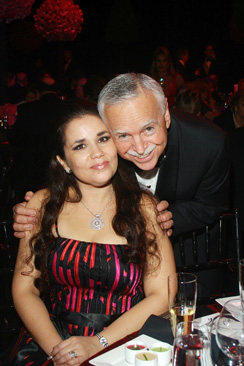With steep highs and lows, FGO’s tribute to Heuer reflects his quarter-century at the helm
Florida Grand Opera’s “Evening to Remember” gala honoring Robert Heuer’s twenty-five years as general director on Wednesday night at the Arsht Center mirrored Heuer’s tenure with the company. The evening’s high points were musically exultant; the low moments were near the bottom of the vocal sphere.
Inevitably on such occasions, there were cancellations. Antonio Barasorda, Aaron St. Clair Nicholson, Lielle Berman and Frederic Antoun (the latter two featured in the company’s current run of The Barber of Seville) were announced as “unable to perform.” Some selections were reassigned to other singers while Mercutio’s aria from Gounod’s Romeo et Juliette and Otello’s monologue from Verdi’s opera were dropped from the program.
On the downside, tenor David Pomeroy’s modest resources were stretched beyond all limits in a painful E lucevan le stelle from Puccini’s Tosca. Katherine Goeldner made shrill going of the Composer’s paean to art from Strauss’ Ariadne auf Naxos, her mezzo beset by foggy vibrato. Although vocally secure, Roderick Williams’ Toreador Song was too small in scale, more picador than matador. Despite some ardently lyrical phrasing, Pomeroy tended to scoop up to notes and go off pitch when singing above the staff negating the Rigoletto quartet.
Kyle Pfortmiller unfurled a sit-up-and-take-notice baritone and beautiful legato line in Valentin’s aria from Gounod’s Faust. For sheer vocal fireworks, nothing could top Eglise Gutierrez’s stunning Qui la voce sua soave from I Puritani. Despite Gary Thor Wedow’s plodding tempo, Gutierrez spun ravishingly beautiful pianissimos and glittering coloratura flourishes, capped by a ringing high C. (FGO should revive this bel canto masterwork for this highly gifted former Miamian.)
Except for Andrew Bidlack’s comprimario-size version of Quanto e bella from Donizetti’s L’Elisir d’Amore and a tentative but vigorous Pearl Fishers duet (by Walters and Fernando de la Mora), the evening’s second half offered considerable vocal thrills. Elizabeth Futral’s stylish Baroque filigree, glamorous timbre and dazzling vocal range lit up the stage in an aria from Handel’s Giulio Cesare, a vivid demonstration of world class singing. Miami-based soprano Elizabeth Caballero offered a limpid version of Micaela’s solo from Carmen and a soaring, lustrous finale from Faust (with de la Mora and the excellent bass-baritone Daniel Mobbs).
Kendall Gladen’s sultry tones set off sparks in one of the temptress Delilah’s arias from the Saint-Saens opera. Veteran soprano Helen Donath sang a Piazzolla tango with wild abandon (and zesty bandoneon accompaniment by David Alsina) and a silvery voiced aria from Lehar’s Giuditta, liltingly conducted by former FGO music director Stewart Robertson. Had Donath not been one of the great Mozart-Strauss sopranos of the last four decades, she could have been an operetta stalwart, so naturally idiomatic was her performance. Sarah Coburn’s high-flying coloratura leaps riveted excitement in the finale of Bellini’s La Sonnambula. Conductors Andrew Bisantz and Steven White led the hard-working orchestra in fine accompaniments.
A big boned, fiery version of the sextet from Lucia di Lammermoor found Futral soaring above the stratosphere, her colleagues working hard to match her brilliance. As an encore, the evening’s entire roster participated in the Brindisi from La Traviata, after which Heuer joined the artists on stage.
Like the concert, Heuer’s quarter-century at the helm of FGO has yielded wildly mixed rewards. Whereas his predecessor Robert Herman favored conservative repertoire with big name artists (Pavarotti, Domingo, Scotto, Freni, Gedda), the early years of the Heuer management saw the introduction of Mozart operas (rarely presented in the past) as repertoire mainstays, conservative American operas (Of Mice and Men, The Postman Always Rings Twice) and presentations of rarely heard works (including the American premiere of Rossini’s Bianca e Faliero), cast with capable vocal talent.
The last decade, however, frequently has brought less innovative repertoire and mediocre or inadequate casting (with some notable exceptions – a riveting Salome, the premiere of David Carlson’s Anna Karenina). As FGO looks to the future, it must rekindle a spirit of adventure and strive to achieve higher artistic standards.
Posted in Performances
2 Responses to “With steep highs and lows, FGO’s tribute to Heuer reflects his quarter-century at the helm”
Leave a Comment
Fri Feb 26, 2010
at 11:41 am
2 Comments


Posted Feb 26, 2010 at 1:17 pm by Nina Wall
once again not even a little nod that some of the opera chorus showed up to sing free in honor of Mr. Heuer. Even though the selections were very short….you could have said that about 25 of the chorus took part.
Posted Feb 27, 2010 at 8:39 am by Antonio
Also the orchestra performed the concert free of charge. FGO really is lucky to have such hard working performers in that pit – this concert in addition to five shows of Barbiere this week. And why are they not part of the company?